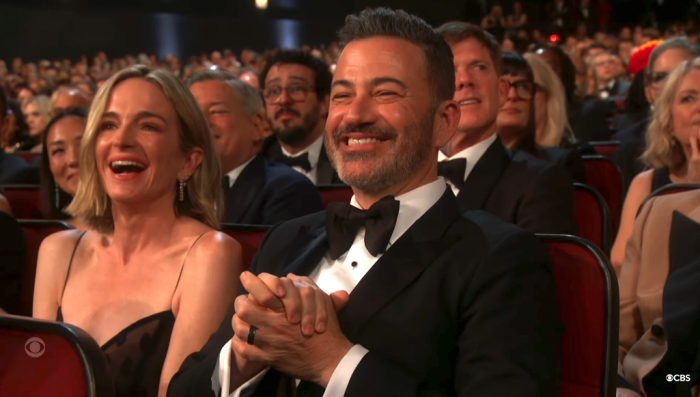By Tori Preston | TV | September 15, 2025

Last night, The Late Show with Stephen Colbert won the Emmy award for Best Talk Series, a satisfying victory for a solid show and a timely victory for a show we know has been cancelled. While Colbert gave a heartwarming acceptance speech about love and loss, the camera cut to crowd reactions, settling on Jimmy Kimmel’s euphoric grin. Kimmel, of course, was Colbert’s fellow nominee in the category, but more importantly, he has been an outspoken supporter of his fellow late-night host. From his comments condemning CBS’s decision to cancel The Late Show to his own For Your Consideration campaign, which included a billboard announcing he’d be voting for Colbert himself, Kimmel may have been instrumental in orchestrating this win. If The Late Show’s cancellation signals the end of an era for late-night television, then Kimmel’s camaraderie is a testament to the way late-night has evolved along the way. Long gone are the days of network rivalries pitting David Letterman against Jay Leno (or Conan O’Brien against Leno, or… well, everyone against Leno). If late-night is going down, it’ll do so not with infighting but with a united front.
There have been many variations of the wisdom “Grow or Die,” but it’s harder to find motivational posters capturing a different truth: “Grow and die anyway.” And yet, just look around and you’ll see it happening everywhere. Now more than ever, there is a palpable sense of loss when I think about the media landscape before me, and the one it has replaced. Streaming grew from both linear television and home entertainment, and yet it has threatened one and arguably killed the other. Online journalism, once such a boon for accessibility, has nearly destroyed the industry whence it came. Cynicism would be easy in the face of such existential destruction — change is inevitable, after all, and so many of these changes are driven not by artistic integrity but corporate greed. Instead, I find myself gravitating toward displays of optimism, of pure sentimentality, as a way to cope. Art about art, about caring about art, and about the way art will always bring us together.
The Paper is an obvious example. As a piece of television, it’s an odd duck. A spinoff of The Office that eschews the timelessness of its predecessor, a comedy about quirky people in a blandly generic setting, and instead offers up a sitcom about mostly normal people (except Esmeralda) in a wildly specific setting: A local newspaper. It’s a comedy about taking up the mantle of a dying profession, but also a show about hope. One man’s passion for journalism encourages a group of people, most of whom have never written before, to join the cause. As a vehicle for laughs, The Paper was hit or miss, but jokes were almost beside the point. I found myself plowing through the wobblier bits of the first season in spite of myself, because I wanted to root for it. Forget “competency porn” — this is integrity porn, where running an exposé against the paper’s own corporate interests is ultimately rewarded. Once upon a time, doing the right thing would have been a thrilling climax; now it’s the height of cozy comfort fantasy.
Glass Heart is another one, if you’re in the market for more soul-balm. This whole piece was originally going to be a review of Netflix’s recent Japanese drama, but what makes the show so special is that, like The Paper, it has divorced itself from reality and operates on a sort of feel-good heart-logic instead. It tells the story of a down-on-her-luck drummer named Akane, who is on the verge of giving up on her dream until a genius composer named Naoki invites her to join his new rock band, Tenblank.
When I say that the show is a love letter to the power of music, I mean that very literally. Tenblank faces all sorts of cartoonish obstacles on their rise up the charts, with plagiarized songs, kidnapping, and evil music producers getting in the way. Yet the solution to every single one of them is a musical number — and considering the actors trained hard to play believably and the songs were written by popular Japanese artists like Yojiro Noda from Radwimps, those numbers are electrifying. The season finale isn’t a climax to the plot but an episode-long concert that ties up the main relationships without ever fully resolving the central conflict: Should Naoki, who has a brain tumor, give up music to save his life, when music is what gives his life meaning? Here, “grow and die anyway” is at its most literal and yet most optimistic. The more Naoki grows as a musician, the closer he is to death. Yet he goes on. Everything changes, and everything dies, but doing what you love with all your heart is the only way to live without regret. If The Paper offers the balm of integrity, then Glass Heart brings the inspiration of fearless passion.
These shows aren’t going to save the world, but they remind us of how we can continue to move through it with grace — by believing in something and doing it against all odds. Maybe I’m just a sucker for a great act of futility, like a bunch of late-night hosts banding together in solidarity in the face of industry pressure. Or maybe the underdog stories that play best these days are the ones about failing without regret.